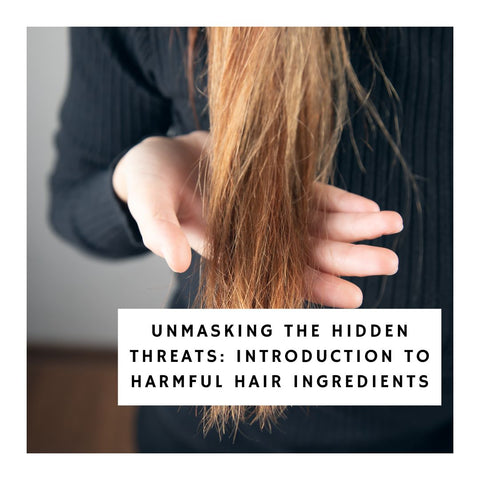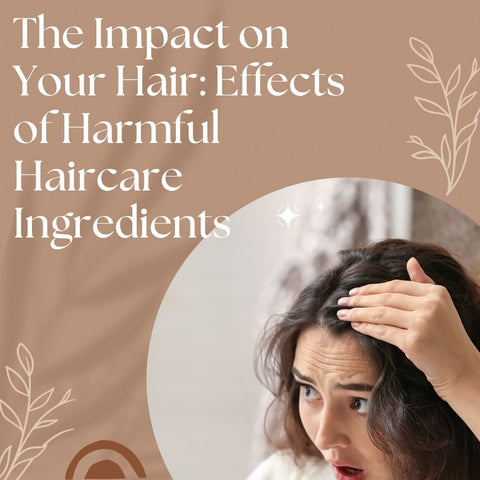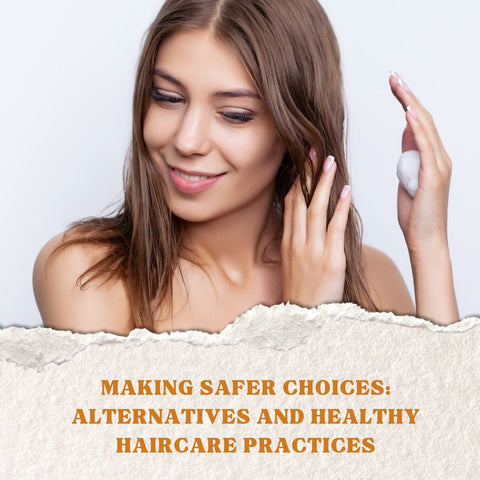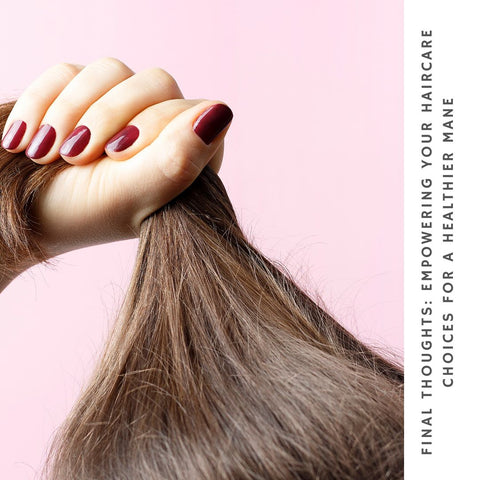Decoding potentially harmful hair care ingredients is critical for maintaining healthy hair. In this blog, we will look at some common ingredients to avoid when using hair care products.
Unmasking the Hidden Threats: Introduction to Harmful Hair Ingredients

Unmasking the hidden dangers lurking in your hair care products is critical for preserving healthy hair. While many substances promise glossy, manageable hair, some may cause more damage than good. Let's start with an overview of dangerous hair components such sulphates, parabens, phthalates, formaldehyde, silicones, alcohols, artificial colours, mineral oil, propylene glycol, and triclosan. By becoming familiar with these dangerous compounds and carefully reading product labels, you can make informed decisions to maintain the health and vibrancy of your hair. Choosing natural, organic, or sulfate-free alternatives will help you keep attractive, robust hair while also ensuring your safety.
Exploring the World of Toxic Haircare: An Overview
Exploring the world of toxic hair care reveals a plethora of problematic ingredients found in many commercial products. Here's an overview to help you navigate the landscape:
-
Shampoos typically contain harsh detergents such as sodium lauryl sulphate (SLS) and sodium laureth sulphate (SLES). They remove natural oils, resulting in dryness and irritation.
-
Parabens (such as methylparaben and propylparaben) are widely used as preservatives but can mimic oestrogen in the body, posing hormone disruption and potential health risks.
-
Phthalates, which are often hidden on ingredient lists as "fragrance," have been linked to endocrine disruption, reproductive issues, and even developmental problems in children.
-
This carcinogenic compound and its releasers, such as formalin, are found in some hair smoothing products and can cause scalp irritation and respiratory problems when inhaled.
-
While silicones provide temporary smoothness and shine, they can cause buildup on the hair, resulting in dullness and weighing it down over time.
-
Certain alcohols, such as ethanol and isopropyl alcohol, dry out the hair and scalp, resulting in dehydration and potential breakage.
-
Synthetic dyes can cause scalp irritation, allergic reactions, and even respiratory issues in sensitive people.
-
Mineral oil, derived from petroleum, can form a barrier on the scalp, potentially clogging pores and interfering with the scalp's normal functions.
-
This synthetic compound can cause skin irritation and allergic reactions, especially in those with sensitive skin.
-
Triclosan, which is commonly found in antibacterial shampoos, has been linked to hormone disruption and antibiotic resistance.
Common Culprits: Identifying Harmful Ingredients in Hair Products
Identifying harmful ingredients in hair products is critical to maintaining healthy hair and scalp. Here are some common culprits to look out for:
-
Sulphates: Look for shampoos that contain sodium lauryl sulfate (SLS) and sodium laureth sulphate (SLES). Sulfates can deplete the hair's natural oils, resulting in dryness and irritation.
-
Parabens: These preservatives, such as methylparaben and propylparaben, are widely used to extend product shelf life, but they have been linked to hormone disruption and other health issues.
-
Phthalates: Often labelled as "fragrance," phthalates can disrupt hormone function and have been linked to reproductive and developmental issues.
-
Formaldehyde: Found in some hair straightening treatments and dyes, formaldehyde and its releasers can irritate the scalp and have carcinogenic properties.
-
Silicones: These ingredients, which end in "-cone" or "-siloxane," provide temporary smoothness and shine but can cause buildup on the hair, resulting in dullness and weighing it down.
-
Alcohols: Certain alcohols, such as ethanol and isopropyl alcohol, dry out the hair and scalp, causing dehydration and possible breakage.
-
Artificial Colours: In sensitive people, synthetic dyes can cause scalp irritation, allergic reactions, and even respiratory problems.
-
Mineral Oil: Made from petroleum, mineral oil can form a barrier on the scalp, potentially clogging pores and interfering with natural oil production.
-
Propylene glycol: This synthetic compound can cause skin irritation and allergic reactions, especially in people with sensitive skin.
-
Triclosan: Found in some antibacterial shampoos, triclosan can disrupt hormone regulation and contribute to antibiotic resistance.
You can protect your hair and overall health by becoming familiar with these harmful ingredients and reading product labels before purchasing. Choosing products that are free of these ingredients, as well as natural and organic alternatives, can help keep your hair healthy and vibrant.
Risks Unveiled: Understanding the Impact on Your Hair
Understanding the effects of harmful ingredients on your hair is critical for making sound decisions about your hair care regimen. Here is a breakdown of the risks associated with some of the most common harmful ingredients:
-
These harsh detergents remove natural oils from your hair and scalp, causing dryness, irritation, and potentially worsening conditions like dandruff or eczema.
-
Parabens, also known as endocrine disruptors, can interfere with hormone function, potentially causing hormonal imbalance, reproductive problems, and even certain types of cancer.
-
These chemicals can disrupt the endocrine system, causing hormonal imbalances, reproductive issues, and developmental problems, particularly in children.
-
Formaldehyde and its releasers can irritate the scalp, causing itching, redness, and dermatitis. Prolonged exposure has been associated with an increased risk of cancer.
-
While silicones provide temporary smoothness and shine, they can cause a buildup on the hair shaft, resulting in dullness, weighing down the hair, and possibly breakage.
-
Certain alcohols can dry out the hair and scalp, causing dehydration, frizz, and breakage, especially in people who already have dry or damaged hair.
-
Synthetic dyes can cause scalp irritation, allergic reactions, and even respiratory problems, particularly in people with sensitive skin or preexisting scalp conditions.
-
Mineral oil can clog your scalp's pores, resulting in a buildup of dirt, oil, and bacteria that can cause scalp acne, folliculitis, and impede hair growth.
-
This ingredient may cause skin irritation and allergic reactions, resulting in scalp itching, redness, and discomfort.
-
Triclosan can disrupt hormone regulation, potentially resulting in hormone imbalance, as well as contribute to antibiotic resistance, making it less effective against harmful bacteria.
You can reduce the risks and keep your hair healthy and vibrant by avoiding products containing these harmful ingredients and instead using natural, organic, or hypoallergenic alternatives.
The Impact on Your Hair: Effects of Harmful Haircare Ingredients

Harmful hair care ingredients can have several negative effects on your hair, scalp, and overall hair health. Let us investigate the specific effects of some of these ingredients.
-
These harsh detergents strip natural oils from the hair and scalp, causing dryness, dullness, and possible scalp irritation. Over time, this can lead to brittle hair prone to breakage and split ends.
-
Parabens, which are known to disrupt hormone function, can cause hormonal imbalances that manifest as hair loss, thinning, or texture changes. They may also cause scalp irritation and allergic reactions.
-
These chemicals may disrupt the endocrine system, affecting hair growth and health. Phthalate exposure can cause hair thinning, scalp inflammation, and even hair loss in severe cases.
-
Formaldehyde, which is found in certain hair smoothing treatments and hair dyes, can irritate the scalp, causing redness, itching, and flakiness. Prolonged exposure may result in scalp damage and hair loss.
-
While silicones provide temporary smoothness and shine, they can also coat the hair shaft, preventing moisture from entering. This can lead to dryness, dullness, and eventual hair breakage.
-
Drying alcohols, such as ethanol and isopropyl alcohol, can deplete the hair's natural oils, resulting in dehydration, frizz, and breakage. They may also irritate the scalp, causing inflammation and discomfort.
-
Synthetic dyes can cause scalp irritation, allergic reactions, and sensitivity. Prolonged exposure to artificial colours may weaken the hair shaft, resulting in brittleness and breakage.
-
Mineral oil can provide temporary hydration, but it can also form a barrier on the scalp, preventing proper moisture balance and potentially clogging hair follicles. This can cause scalp irritation, acne, and inhibited hair growth.
-
This ingredient can cause skin irritation and allergic reactions, including scalp itching, redness, and inflammation. Prolonged exposure can disrupt the scalp's natural pH balance, causing dryness and discomfort.
-
Triclosan can disrupt the scalp's microbiome and natural bacterial balance, causing irritation, inflammation, and possible hair damage. It may also contribute to antibiotic resistance, threatening scalp health in the long run.
Hair in Peril: The Harmful Effects of Toxic Substances
Toxic substances in hair care products can harm your hair's health and appearance. Here's a closer look at their harmful effects:
-
Dryness and Frizz: Sulfates strip natural oils from your hair, leaving it dry and frizzy. This can leave your hair feeling brittle and looking dull.
-
Scalp Irritation: Harsh chemicals, such as parabens and formaldehyde, can cause redness, itching, and inflammation. This discomfort can be both irritating and harmful to the scalp's health.
-
Hair Breakage and Split Ends: Silicones may provide temporary smoothness, but they can build up on the hair shaft, leading to breakage and split ends over time. This may lead to fragile, damaged hair that is challenging to handle.
-
Hair Loss: Toxic substances such as phthalates and triclosan have been linked to hormonal disruption, which can lead to hair loss and thinning over time. This can be especially concerning for people who already have hair loss or thinning issues.
-
Allergic Reactions: Hair care products contain common allergens such as artificial colours and fragrances. They can cause allergic reactions like itching, redness, swelling, and even blistering on the scalp or skin.
-
Clogged Hair Follicles: Mineral oil and propylene glycol can clog hair follicles and scalp pores. This can result in scalp acne, folliculitis, and impaired hair growth.
-
Hormonal Imbalance: Parabens, phthalates, and other endocrine-disrupting chemicals can impair hormone function in the body. This disruption can cause hormonal imbalances that impact hair growth, texture, and overall health.
-
Respiratory Issues: Formaldehyde and its releasers are volatile organic compounds (VOCs) that can be released into the atmosphere when in use. Prolonged exposure to these substances can irritate the respiratory system, raising the risk of respiratory problems over time.
To protect your hair from these harmful effects, carefully read ingredient labels and select products free of toxic substances. Choosing natural, organic, or hypoallergenic hair care products can help reduce chemical exposure while also promoting healthier, happier hair.
Breaking Down the Risks: The Dangers of Hair Care Chemicals
Understanding the potential harm of hair care chemicals requires a breakdown of the risks involved. Here's a closer look at the dangers they pose:
-
Skin Irritation and Allergies: Many hair care chemicals, including sulfates, parabens, and synthetic fragrances, can irritate the scalp and skin, causing redness, itching, and allergic reactions. Prolonged exposure to these irritants can worsen existing skin conditions and cause discomfort.
-
Dryness and Damage: Harsh detergents, such as sulphates, deplete the hair's natural oils, resulting in dryness, brittleness, and damage. Over time, this can lead to split ends, breakage, and a weakened hair structure.
-
Hormone Disruption: Some chemicals, such as parabens, phthalates, and triclosan, are known endocrine disruptors. They can disrupt hormone function in the body, potentially resulting in hormonal imbalances, reproductive issues, and other health problems.
-
Carcinogenicity: Some hair smoothing treatments and hair dyes contain formaldehyde and its releasers, which are carcinogens. Prolonged exposure to these chemicals may increase the risk of cancer, especially among salon workers and frequent users of such products.
-
Respiratory Issues: Volatile organic compounds (VOCs) such as formaldehyde can be released into the air during hair treatments, causing respiratory irritation and exacerbating asthma or allergies. Proper ventilation is critical for reducing exposure to these harmful fumes.
-
Scalp and Hair Follicle Damage: Mineral oil and propylene glycol can clog hair follicles and pores on the scalp, resulting in scalp acne, folliculitis, and stunted hair growth. This can result in a range of scalp discomforts and hinder healthy hair growth.
-
Environmental Impact: Chemicals washed down the drain during hair washing can enter waterways and ecosystems, posing risks to aquatic life and the environment. This includes ingredients like sulfates, parabens, and silicones, which are persistent pollutants.
To reduce these risks, select hair care products that prioritise safety and avoid hazardous chemicals whenever possible. Choosing natural, organic, or hypoallergenic alternatives can help protect your hair and your overall health. Additionally, advocating for stricter regulations on hair care product ingredients can help promote safer choices for consumers and salon professionals alike.
Navigating the Hazards: How Harmful Ingredients Damage Your Hair
To navigate the hazards of harmful ingredients in hair care products, you must first understand how these substances can damage your hair. Here's how they can damage your hair's health:
-
Stripping Natural Oils: Shampoos often contain harsh detergents, such as sulfates, to create lather and cleanse the hair. However, they can deplete the scalp's natural oils, causing dryness, irritation, and an imbalance in moisture levels.
-
Weakening the Hair Shaft: Certain chemicals, such as sulphates and silicones, can weaken the hair shaft over time. This makes the hair more susceptible to breakage, split ends, and overall damage, resulting in a loss of strength and resilience.
-
Blocking Moisture: Silicones and mineral oil can form a barrier on the hair shaft, preventing moisture from penetrating and nourishing it. This can result in dry, brittle hair that lacks elasticity and shine.
-
Irritating the Scalp: Chemicals such as sulphates, parabens, and artificial fragrances can irritate the scalp, causing redness, itching, and inflammation. Prolonged exposure to these irritants can harm the scalp's delicate skin and jeopardise its overall health.
-
Disrupting the Hair Growth Cycle: Endocrine-disrupting chemicals, such as parabens and phthalates, can interfere with hormone function in the body. This disruption can affect the hair growth cycle, resulting in hair thinning, shedding, and slowing hair growth over time.
-
Allergic Reactions: Hair care products contain common allergens such as synthetic fragrances, dyes, and preservatives. They can cause allergic reactions in sensitive people, such as itching, redness, swelling, and even blisters on the scalp or skin.
-
Exposure to Carcinogens: Some chemicals, such as formaldehyde and its releasers, are known to cause cancer. Prolonged exposure to these substances, which are commonly found in hair straightening treatments and hair dyes, may increase the risk of cancer, especially among salon workers and frequent users of such products.
Making Safer Choices: Alternatives and Healthy Haircare Practices

Making safer hair care choices entails using products with natural, nourishing ingredients and practicing healthy hair care techniques. Here are some options and practices to consider:
-
Choose Sulfate-Free Shampoos: Avoid stripping your hair of its natural oils by using sulfate-free shampoos. Instead, use gentle cleansers like plant-based surfactants or sulphate substitutes like coco-sulfates.
-
Use Natural Oils: Incorporate natural oils like coconut oil, argan oil, or jojoba oil into your hair care regimen. These oils can moisturise and nourish your hair, making it soft, shiny, and more resilient.
-
Look for Paraben-Free and Phthalate-Free Products: Select hair care products devoid of phthalates and parabens to reduce your exposure to chemicals that can disrupt your hormones. Instead, choose products preserved with natural ingredients, such as essential oils or plant extracts.
-
Avoid Formaldehyde and Formaldehyde-Releasing Agents: Avoid hair smoothing treatments and dyes that contain formaldehyde or its releasers. Choose formaldehyde-free alternatives or seek out safe, non-toxic salon treatments.
-
Embrace Silicone-Free Formulas: To avoid buildup and weigh-down, use silicone-free hair care products. Look for silicone-free conditioners and styling products that contain natural ingredients to add moisture and shine.
-
Opt for Alcohol-Free Formulations: Avoid products that contain drying alcohols such as ethanol and isopropyl alcohol, which can remove moisture from your hair and scalp. Instead, choose alcohol-free formulas that won't cause dehydration or irritation.
-
Choose Naturally Derived Colours and Fragrances: Look for hair care products that contain naturally derived colours and fragrances rather than synthetic ones. This can reduce the likelihood of allergic reactions and sensitivities while maintaining a pleasant scent and colour.
-
Prioritise Scalp Health: Incorporate scalp treatments and gentle exfoliation into your daily routine to keep your scalp healthy. This can help to remove buildup, increase circulation, and improve overall hair health.
-
Gentle Hair Care: Avoid excessive heat styling, over-brushing, and tight hairstyles, which can all cause breakage and damage. Use wide-tooth combs, satin pillowcases, and protective styles to reduce hair stress.
-
Stay Informed and Read Labels: Learn about common harmful ingredients in hair care products and develop your ability to read labels. Look for certifications such as "organic," "cruelty-free," and "vegan" to ensure you are making decisions that are consistent with your values and priorities.
By incorporating these alternatives and healthy hair care practices into your routine, you can nourish and protect your hair while limiting your exposure to harmful chemicals and toxins.
Choosing Wisely: Identifying Safe Alternatives for Hair Products
Finding safe alternatives to hair products includes looking for formulations that prioritise natural, nurturing components while avoiding harsh chemicals. To make wise choices, look for organic and natural ingredients, look for certifications, avoid harsh detergents, seek silicone-free formulas, choose paraben-free and phthalate-free products, avoid formaldehyde and formaldehyde-releasing agents, choose alcohol-free formulations, choose naturally derived colours and fragrances, consider hypoallergenic formulations, and read ingredient labels. By following these rules and using safe hair products, you may nourish and protect your hair while reducing your exposure to dangerous chemicals and pollutants.
The Path to Healthier Hair: Chemical-Free Haircare Solutions
Transitioning to chemical-free hair care products can result in healthier, more vibrant hair over time. Here are some chemical-free options and practices to consider:
-
Natural Shampoos: Look for plant-based shampoos that are sulfate-free and made with gentle surfactants like coconut or sugar. These cleansers effectively remove dirt and oil without depleting the hair's natural oils.
-
Homemade Shampoos: Try making your shampoo with natural ingredients like castile soap, aloe vera gel, and essential oils. DIY shampoos can be tailored to your specific hair type and preferences.
-
Co-Washing: Co-washing, also known as conditioner washing, is rinsing hair with conditioner rather than shampoo. Look for silicone-free conditioners that offer gentle cleansing and hydration without weighing down your hair.
-
Apple Cider Vinegar Rinse: Apple cider vinegar (ACV) can help clear the hair and scalp by removing buildup and balancing pH levels. Dilute ACV with water and apply as a final rinse after shampooing to promote shine and scalp health.
-
Natural Oils: Incorporate natural oils such as coconut oil, argan oil, and jojoba oil into your hair care regimen. These oils can moisturize, nourish, and protect the hair, making it soft, shiny, and more resilient.
-
Herbal Hair Rinses: Hair rinses infused with herbs such as rosemary, chamomile, and lavender can improve scalp health, stimulate hair growth, and add shine to hair. Steep herbs in hot water, strain, and apply as a final rinse after shampooing.
-
Avoiding Heat Styling: Use flat irons, curling irons, and blow dryers sparingly because too much heat can damage the hair cuticle, resulting in breakage and split ends. Instead, embrace air-drying and heatless styling techniques.
-
Protective Hairstyles: To reduce manipulation and prevent breakage, try protective hairstyles such as braids, buns, and twists. Satin or silk hair ties and pillowcases can help to reduce friction and friction-induced damage.
-
Regular Trims: To get rid of split ends and stop them from moving up the hair shaft, schedule regular trims every 6 to 8 weeks. This helps maintain the overall health and appearance of your hair.
-
Scalp Massage: Include scalp massage in your hair care regimen to ease tension, encourage hair growth, and improve circulation. Before shampooing, spend a few minutes using your fingertips to gently massage the scalp in circular motions.
You can nourish and protect your hair while promoting its natural beauty and vitality by using chemical-free hair care products and following healthy hair care practices.
Ingredient Awareness: Safeguarding Your Hair Health
Being aware of the ingredients in your hair care products is critical for maintaining your hair's health. Here's how to ensure ingredient awareness so you can make informed choices:
-
Read Labels Carefully: Take the time to read the ingredient labels on your hair care products. Look for common harmful ingredients such as sulfates, parabens, phthalates, formaldehyde, silicones, and artificial colors and fragrances.
-
Educate Yourself: Understand the potential risks and effects of harmful ingredients on hair health. Stay current on scientific research and industry trends concerning hair care ingredients.
-
Look for Natural and Organic Ingredients: When possible, use hair care products that contain natural and organic ingredients. Look for plant-based surfactants, essential oils, herbal extracts, and other botanicals with nourishing and beneficial properties.
-
Avoid Harsh Chemicals: Avoid using harsh detergents such as sulphates, which can deplete the hair's natural oils and cause dryness and damage. Choose sulfate-free shampoos and cleansers that offer gentle yet effective cleansing.
-
Choose Hypoallergenic Formulations: If you have sensitive skin or allergies, look for hypoallergenic hair care products that are designed to reduce irritation and allergic reactions. Look for products that are hypoallergenic or dermatologist-tested.
-
Avoid Endocrine Disruptors: Ingredients known as endocrine disruptors, such as parabens and phthalates, can interfere with hormone function in the body. Choose products that do not contain these harmful chemicals.
-
Choose Transparent Brands: Select hair care products that are open about their ingredients and manufacturing processes. Look for brands that put safety, transparency, and sustainability first in their product formulations.
-
Experiment with DIY Recipes: Try making your hair care products with natural ingredients from your kitchen. This allows you to tailor formulations to your specific hair type and preferences while avoiding potentially harmful chemicals.
-
Consult with Professionals: If you are not sure which products are best for your hair type and concerns, speak with a dermatologist, trichologist, or hairstylist who can make personalised recommendations based on your specific requirements.
By being aware of the ingredients in your hair care products and making informed decisions, you can protect your hair's health and promote healthy, beautiful hair.
Final Thoughts: Empowering Your Haircare Choices for a Healthier Mane

To achieve healthier hair, you must first educate yourself and make informed choices. Here are some final thoughts to assist you with your hair care endeavours:
-
Learn about the ingredients in your hair care products and how they may affect your hair's health. By reading labels and staying informed, you can make decisions that are consistent with your hair care goals.
-
When it comes to hair care products, quality should take precedence over quantity. Invest in products made with nourishing, natural ingredients that promote hair health and vitality.
-
Pay attention to how your hair reacts to various products and ingredients. Experiment with different formulations and adjust your routine to meet your hair's needs and preferences.
-
Remember that many factors influence hair health, including diet, lifestyle, and overall well-being. Take a holistic approach to hair care by nourishing your body from within and practicing self-care rituals that promote relaxation and stress reduction.
-
Experiment with various hair care techniques, products, and trends. Keep an open mind and be willing to try new approaches that may improve the health and appearance of your hair.
-
Consult with dermatologists, trichologists, and hairstylists for personalised advice and recommendations. They can provide useful insights and expertise to help you achieve your hair care objectives.
-
Embrace your hair's natural texture, colour, and characteristics. Celebrate its uniqueness and beauty without comparing it to unrealistic standards. Remember, healthy hair comes in a variety of shapes, sizes, and styles.
You can cultivate a healthier, happier mane that reflects your individuality and vitality by educating yourself, making conscious choices, and adopting a holistic approach to hair care. Here's to a journey full of beautiful, healthy hair!
















